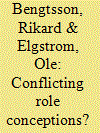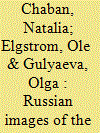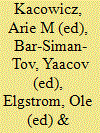|
|
|
Sort Order |
|
|
|
Items / Page
|
|
|
|
|
|
|
| Srl | Item |
| 1 |
ID:
111637


|
|
|
|
|
| Publication |
2012.
|
| Summary/Abstract |
This article utilizes role theory for analysing the role(s) of the European Union (EU) in global politics. Specifically addressing the interplay of the EU's own role perception and the role expectations held by other actors, the article contributes two case studies of the role(s) of the EU in relation to two important but different actor groupings-Eastern Europe including Russia and the ACP countries in the developing world, respectively. The analysis points to the tensions that exist between self-perceptions and the perceptions of the EU's counterparts in Eastern Europe and the developing world, and how these tensions influences the interaction between the actors.
|
|
|
|
|
|
|
|
|
|
|
|
|
|
|
|
| 2 |
ID:
071740


|
|
|
|
|
| Publication |
London, Routledge, 2006.
|
| Description |
xix, 260p.
|
| Standard Number |
0415390931
|
|
|
|
|
|
|
|
|
|
|
|
Copies: C:1/I:0,R:0,Q:0
Circulation
| Accession# | Call# | Current Location | Status | Policy | Location |
| 051227 | 341.2422/ELG 051227 | Main | On Shelf | General | |
|
|
|
|
| 3 |
ID:
153553


|
|
|
|
|
| Summary/Abstract |
This article probes into scope conditions for image change, investigating what changes in Russian images of the European Union (EU) have taken place as a result of the Russian–Ukrainian crisis. The crisis, a catalytic event, has been surrounded by uncertainty and strong emotions and is seen as a potential historical watershed in EU–Russian relations. The article examines Russia’s images of the EU’s intentions (good or bad?), capabilities (strong or weak?), and cultural and political status (inferior or superior?); and how they change in connection with the Russian–Ukrainian crisis. The article compares EU images across time found in Russian major newspapers and public opinion (studies undertaken in 2011–12 and 2015, before and after the crisis).
|
|
|
|
|
|
|
|
|
|
|
|
|
|
|
|
| 4 |
ID:
046951


|
|
|
|
|
| Publication |
Lanham, Rowman & Littlefield Publishers, 2000.
|
| Description |
xx, 326p.
|
| Standard Number |
0742501809
|
|
|
|
|
|
|
|
|
|
|
|
Copies: C:1/I:0,R:0,Q:0
Circulation
| Accession# | Call# | Current Location | Status | Policy | Location |
| 044170 | 327.172/KAC 044170 | Main | On Shelf | General | |
|
|
|
|
| 5 |
ID:
099790


|
|
|
|
|
| Publication |
2010.
|
| Summary/Abstract |
Since the early 1990s, the European Union (EU) has presented itself as a leader on climate change. Recently, however, this picture has been challenged in the media and by non-governmental organization representatives. The aim of our article is to evaluate the Union's present role in the area of international climate politics. We do this by scrutinizing the EU's own role conception, but also, and primarily, by investigating the perceptions and expectations of government representatives from outside the Union itself. Our results - reflecting external perceptions of the EU after COP 14 (Conference of the Parties) in December 2008 - demonstrate that the EU is indeed still seen as a green leader. Officials from both developing states and major powers share the view of the Union as a largely coherent and credible leader, though some observers question the correspondence between what the EU says and what it does. The EU is mainly perceived to lead by example by being a role model for other state actors. We discuss how these results fare in the light of the COP 15 Copenhagen meeting in December 2009.
|
|
|
|
|
|
|
|
|
|
|
|
|
|
|
|
|
|
|
|
|